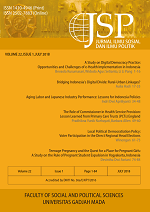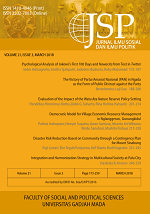The Role of Information and Communication Technology for Economic Sustainability through Social Entrepreneurship Practices in Indonesia: A Preliminary Study
Lisa Lindawati(1*)
(1) Department of Communication Science, Faculty of Social and Political Sciences, Universitas Gadjah Mada, Indonesia.
(*) Corresponding Author
Abstract
ICT provides an environment that encourages the development of social entrepreneurship. Regarding its definition, social entrepreneurship is the “third way” of the two sectors running dichotomously: business entities that tend to be profitable and social institutions that are not profit-oriented. The social business carries out business activities with a social mission. Social movements were at different poles from profit-seeking efforts in the past, and digital technology enabled them to achieve them simultaneously. One of the supporting factors is its ability to reduce production, distribution, and even promotion costs. On the other hand, ICT allows social entrepreneurs to amplify their stories. There are no fundamental differences between commercial and social business activities. Both of them produce goods or services. The distinguishing elements are how they do business, the actors involved, and the eventual pursuit. If the commercial company tends to profit, social enterprise talks about social impact. Profit is a medium or tool to have a social impact on business. In the last five years, social entrepreneurship trends have maturated in Indonesia. This trend attracts researchers to take a deeper look at the sustainability aspects brought by social entrepreneurs. As preliminary research, this study explores how social entrepreneurship supports economic sustainability.
Keywords
Full Text:
PDFReferences
Austin, James; Stevenson, Howard; Wei-Skillern, J. (2006). Social and Commercial Entrepreneurship Same, Different or Both.
Balachandran, V. (2013). Impact of information technology on entrepreneurship (e-Entrepreneurship). Journal of Business Management & Social Sciences Research (JBM&SSR), 2(2), 51-56.
BBC News Indonesia. (2020). Empat Hal di Balik Angka Kemiskinan Indonesia yang disebut Mencatat ’sejarah. BBC News Indonesia. BBC News Indonesia. https://www.bbc.com/indonesia/trensosial-44861258
Borgaza, C., & Defourny, J. (2001). The Emergence of Social Enterprise. Routledge.
BPS. (2018). Gini Ratio Tercatat Sebesar 0.389. Bps.G o.Id. https://www.bps.go.id/ pressrelease/2018/07/16/1533/gini-ratio-maret-2018-tercatat-sebesar-0-389.html
BPS. (2020). Ekonomi Indonesia 2020 Turun sebesar 2,07 Persen. Bps.Go.Id. https://www.bps.go.id/pressrelease/2021/02/05/1811/ ekonomi-indonesia-2020-turun-sebesar-2-07-persen--c-to-c-.html
BPS. (2021). Persentase Penduduk Miskin Maret 2021 turun menjadi 10,14 persen.
Carpentier, N. (2006). Towards a sustainable information society: Deconstructing WSIS. http://www.intellectbooks.co.uk/books/ view-Book,id=4542/
databoks. (2021). Penetrasi Internet Indonesia Urutan ke-15 di Asia pada 2021. Databoks.
Ejemeyovwi, J. O., Osabuohien, E. S., Bowale, E. K., O Abuh, O., Adedoyin, J. P., & Ayanda, B. (2019). Information and Communication Technology Adoption and Innovation for Sustainable Entrepreneurship. Journal of Physics: Conference Series, 1378(2). https:// doi.org/10.1088/1742-6596/1378/2/022085
Fransisca, G. (2014). Rhenald Kasali: Indonesia Butuh Banyak Sociopreneur. Kontan.
Fuchs, C. (2008). The implications of new information and communication technologies for sustainability. Environment, Development and Sustainability, 10(3), 291–309. https://doi.org/10.1007/s10668-006-9065-0
Kariuki, D. W. (2021). ICT for Sustainability or Sustainability in ICT? A Review of the Role of ICT in Enhancing Sustainability versus the Need to Enhance Sustainability in ICT. East African Journal of Information Technology, 3(1), 7–21. https://doi.org/10.37284/eajit.3.1.333
Kitabisa. (2020). About Us Kitabisa.com.
Kumparan. (2019). 67 Persen Pelaku Social Enterprise di Indonesia adalah Anak Muda. Kumparan.
Kuwado, F. J. (2018). Jumlah Enterpeneur di Indonesia Jauh di bawah Negara Maju. Kompas.com.
Lindawati, L. (2019). Kekuatan Cerita dalam Bisnis Sosial (Sociopreneur is A Storyteller). Jurnal Studi Pemuda, 7(2), 100. https://doi. org/10.22146/studipemudaugm.39643
Nicholls, A., Yunus, M., Drayton, B., Young, R., & Mulgan, G. (2006). Social Ent repreneurship: New Models of Sustainable Social Change. In A. Nicholls (Ed.), Oxford. Oxford University Press.
Servaes, J., & Malikhao, P. (2007). Communication and Sustainable Development: Selected Papers from the 9th UN Roundtable on communication for development. In Research and Extension Division Natural Resources Management and Environment Department FAO. https://doi. org/10.1007/978-1-349-02101-7_8
Skinner, G. D. (2009). A Study into Fostering Entrepreneurship in Information Communication Technology ( ICT ). International Journal, 2(4), 108–116.
Standing, C., Jackson, P., Chen,A. J. w., Boudreau, M. C., & Watson, R. T. (2008). Information systems and ecological sustainability. Journal of Systems and Information Technology, 10(3), 186–201. https://doi.org/10.1108/13287260810916907
Stenn, T. L. (2017). Social Entrepreneurship as Sustainable Development. Palgrave Macmillan.
Steyaert, C. H. D. (2006). Entrepreneurship as Social Change. Edward Elgar.
Walfajri, M. (2018). Menkop UKM: Rasio Wirausaha Indonesia Sudah Lebih dari 7 persen. Kontan.
Wustenhagen, R. (2018). Sustainable Innovation and Entrepreneurship. Edward Elgar.
Article Metrics
Refbacks
- There are currently no refbacks.
Copyright (c) 2022 Jurnal Ilmu Sosial dan Ilmu Politik

This work is licensed under a Creative Commons Attribution-NonCommercial-NoDerivatives 4.0 International License.






















